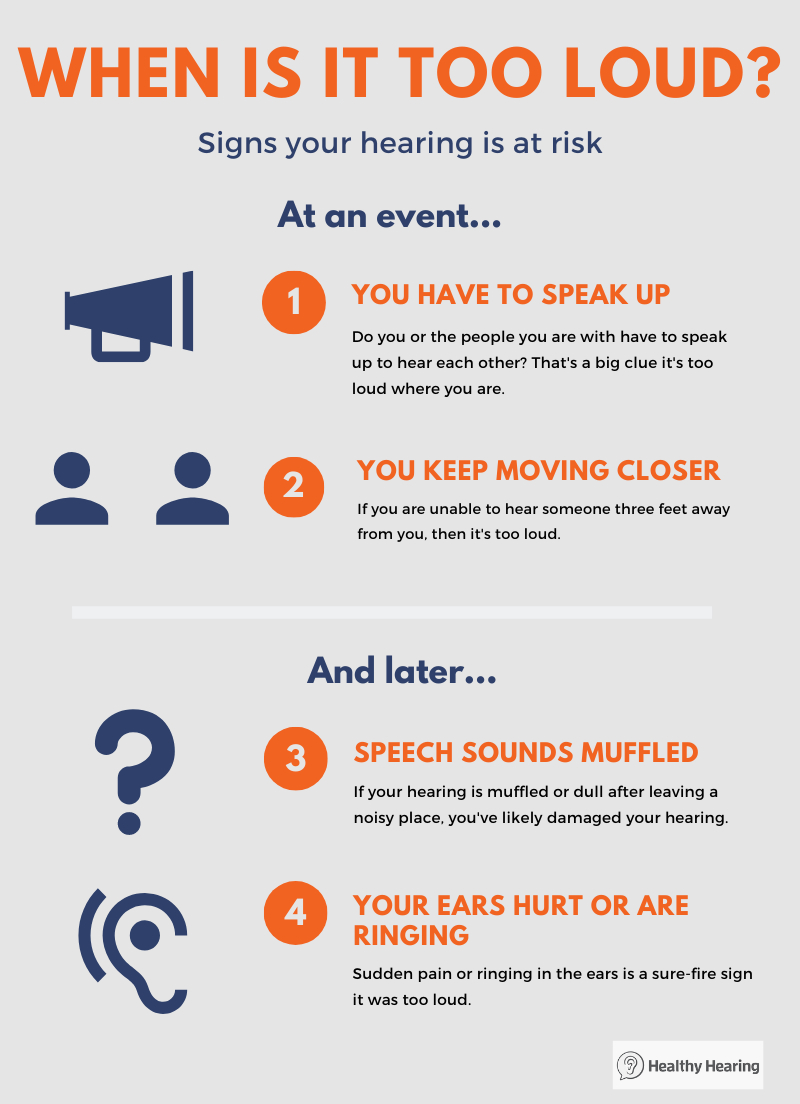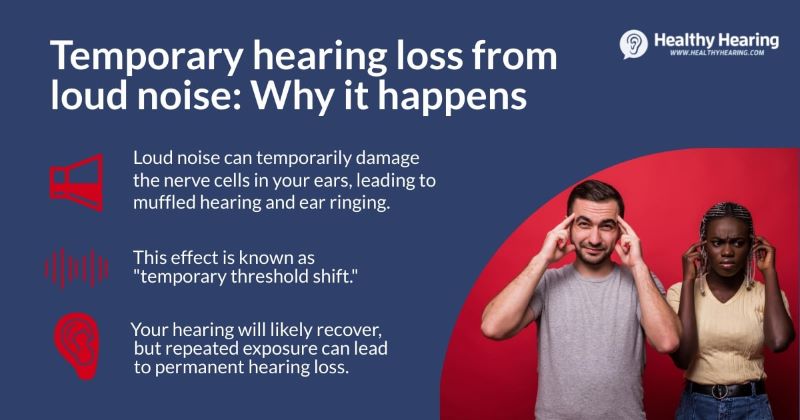Key points:
-
Muffled hearing or ear ringing after being in a loud environment is known as temporary threshold shift (TTS).
-
Your hearing will likely return to normal within a few hours or days.
-
While temporary, repeated exposure to loud noise can lead to permanent hearing loss and tinnitus.
Ever left a concert or loud event and noticed your hearing seemed different? Maybe everything sounded muffled, or you had an annoying ringing or buzzing in your ears.
What you experienced is called a temporary threshold shift (TTS)—a measureable short-term change in your hearing after loud noise exposure. In simple terms, your normal hearing threshhold gets worse, meaning you don't hear as well as you normally do.
As the name suggests, these symptoms usually go away. However, repeated exposure to loud noise can permanently damage your hearing over time.
Symptoms of temporary threshold shift
After loud noise, you may notice:
- Ear fullness
- Tinnitus (ringing or buzzing in one or both ears)
- Temporary hearing loss
- Feeling slightly disoriented or unbalanced
Why do my ears ring or feel muffled after a concert?
These symptoms happen after a concert or other loud event because the tiny hair cells in your inner ear—which help you hear—are temporarily damaged by the intensity of the noise.
Concerts are a big offender. Stand by the speakers at a show, and it might reach 110 decibels, notes audiologist Steve DeMari, director of business development and education at CaptionCall. “That’s extremely loud,” he notes.
Apart from concerts, other causes of TTS can include:

are very loud and can cause TTS.
- Listening to music loudly through earbuds or headphones
- Attending loud sporting events
- Fireworks
- Explosions, including gunfire
- Using tools like lawn mowers or leaf blowers
- Riding motorcycles or ATVs
Bartenders and others at risk of hearing damage
Many people who work in loud environments like bars and restaurants can be at an increased risk.
For example, a small study published in 2023 found that 75% of bartenders tested experienced a TTS greater than five decibels after being exposed to loud music at work, with a smaller amount (less than 10%) experiencing TTS as large as 15-18 dB.
In practical terms, this means that most of the bartenders in the study experienced a drop in hearing sensitivity of at least five decibels. As a result, quiet sounds would need to be five or more decibels louder than usual for them to be heard during a temporary threshold shift (TTS).
How long does muffled loss last?
While it can vary a bit, hearing loss and other symptoms from TTS resolve after a short time, often within a few hours. However, longer or more intense noise exposure may cause symptoms that last days or even weeks.
Eventually though, your hearing will return to its normal baseline.
It's important to note that there are other causes of temporary hearing loss, which may require treatment and have a different recovery time.
Is a temporary change in your hearing serious?
A one-time experience of TTS is unlikely to cause permanent damage. “When they say temporary, they truly do mean temporary,” DeMari says.
When temporary hearing loss becomes permanent
While TTS is temporary, that doesn't mean it is safe to go to concerts regularly and get your ears blown out—or frequently be around any other loud noises without ear protection.
Over time, if you experience TTS frequently, it can become a permanent threshold shift (PTS), according to a review of threshold shifts in the journal Otology and Neurotology.
In other words, repeated exposure to loud sounds can cause permanent damage to the hair cells of your inner ear, leading to noise-induced hearing loss.

How to protect your hearing
The good news is that you can do a lot to protect your hearing. Take these steps to prevent temporary and permanent hearing loss and tinnitus caused by noise:
- Use hearing protection like earplugs or earmuffs
- Check the decibel level when using headphones or earbuds to make sure it's in a safe range
- Take breaks and moving to quieter areas when possible
When to see an audiologist
If you’re experiencing TTS after being exposed to noise, give it some time for the effects to wear off. If things don’t return to normal within a few weeks, check in with an audiologist, ENT or other hearing specialist.
If you're noticing symptoms like muffled hearing or ringing in your ears—but haven’t recently been around loud noise—it’s a good idea to make an appointment with a hearing care provider.
Although you cannot cure any permanent hearing loss, effective treatment options, including hearing aids, can improve your hearing and your quality of life.
Visit our directory to read reviews of hearing clinics near you.
The above is the interpretation of Temporary Threshold Shift: Why Your Hearing is Muffled After Noise provided by Chinese hearing aid supplier Shenrui Medical. Link https://www.srmcm.com/Blog/Temporary_Threshold_Shift_Why_Your_Hearing_is_Muffled_After_Noise.html of this article is welcome to share and forward. For more hearing aid related information, please visit Blog or take a look at our Hearing aids products
















